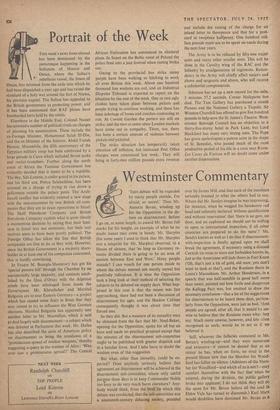Portrait of the Week
Elsewhere in the Middle East, Colonel Nasser has arrested a number of political rivals on charges of planning his assassination. These include the ex-Foreign Minister, Mohammed Salah El-Din, and the ex-Minister of the Interior, Abdel Fattah Hassan. Meanwhile, the fifth anniversary of the Egyptian military coup has been celebrated by a large parade in Cairo which included Soviet tank§ and rocket-launchers. Farther along the north coast of Africa the Tunisian Government has evidently decided that it wants to be a republic. The Bey, Sidi Lamine, is under guard in his palace, and his third son, Prince Salaheddine, has been arrested on a charge of trying to run down a policeman outside the palace gates. The Arab- Israeli conflict has evidently entered a new stage with the announcement by two British oil com- panies that they are to cease operations in Israel. The Shell Petroleum Company and British Petroleum Company explain what is quite clearly a momentous decision by saying that their busi- ness in Israel was not economic, but their real motives seem to have been purely political. The Foreign Office has taken the line that British companies are free to do as they wish. However, since the British Government is a majority share- holder in at least one of the companies concerned, this is hardly convincing.
In France M. Bourges-Maunoury has got his 'special powers bill' through the Chamber by an unexpectedly large majority, and contacts estab- lished by the Quai d'Orsay with the Algerian rebels have been sabotaged from inside the Government. Mr. Khrushchev and Marshal Bulganin are to tour Eastern Germany—a project which has caused some fears in Bonn that they may intend to try to influence the West German elections. Marshal Bulganin has apparently sent another letter to Mr. Macmillan, which is said to deal largely with disarmament—a subject which was debated in Parliament this week. Mr. Dulles has also described the aims of American policy on disarmament as being the avoidance of a 'promiscuous spread of nuclear weapons,' thereby suggesting a query in the manner of Alice: 'Who ever saw a promiscuous spread?' The Central African Federation has announced its electoral plans. In Sopot on the Baltic coast of Poland the police fired into a jazz festival when rioting broke out.
Owing to the provincial bus strike many people have been walking or hitching to work all over Britain this 'week. About one hundred thousand bus workers are out, and an Industrial Disputes Tribunal is expected to report on the situation by the end of the week. One or two ugly clashes have taken place between pickets and people trying to continue working, and there has been sabotage of buses and coaches continuing to run. At Covent Garden the porters are still on strike, and the men at some other London markets have come out in sympathy. There, too, there has been a certain amount of violence between pickets and picketed.
The strike situation has temporarily taken attention off inflation, but increased Post Office charges were announced last week. They will bring in forty-two million pounds extra revenue and include the raising of the charge for an inland letter, to threepence and that for a post- card to twopence halfpenny. One hundred mil- lion pounds more are to be spent on roads during the next four years.
The Army is to be reduced by fifty-one major units and many other smaller ones. This will be done in the Cavalry wing of the RAC and the Infantry by amalgamation of regiments. Redun- dancy in the Army will chiefly affect majors and above and sergeants and above, who will receive a substantial compensation.
Ibbotson has set up a new record for the mile, 3 minutes 57.2 seconds. Curzio Malaparte has died. The Tate Gallery has purchased a recent Picasso and the National Gallery a Tiepolo. Sir Winston Churchill has offered to give five hundred pounds to help save the St. James's Theatre. West- minster Borough Council has no objection to a thirty-five-storey hotel in Park Lane, but Lord Blackford has many very strong ones. The Pope has given speleologists a.patron saint in the shape of St. Benedict, who passed much of the most productive period of his life in a cave near Rome. Les Caves du Vatican will no doubt come under another dispensation.






























 Previous page
Previous page